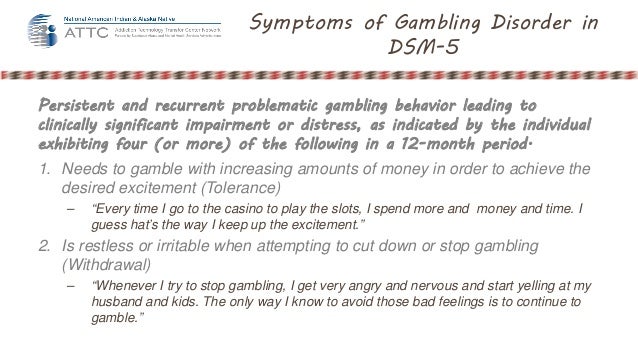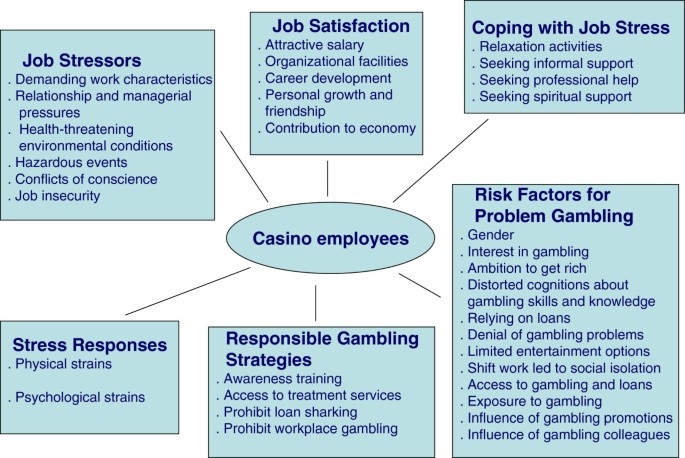Distress Tolerance (Dialectical Behavior Therapy)


When people 'cope' with stress and crisis, they find out ways (behaviors) that relieve stress, however, some of these ways come with heavy consequences. Examples of ineffective behaviors are drug and alcohol use, self-injury, gambling, spending money, and overeating.
We can learn distress tolerance skills to effectively manage the stress and crisis. These skills are more helpful than dealing with the consequences of the ineffective behaviors that make life worse.

A gambling disorder or pathological gambling is a pattern of behavior that severely impacts a person's family, job, or personal life. One of the signs that gambling has become a concern is when a person feels an urgent need to keep gambling or to take even greater risks to reverse a loss. Distress Tolerance Distress Tolerance skills are used when we are unable, unwilling, or it would be inappropriate to change a situation. It's important to use the right skills at the right time. In order to change a situation or emotion, we would use Emotion Regulation skills (page 21). Distress Tolerance skills are used to help us cope. Free casino dealer training. DISTRESS TOLERANCE Focus on Radical Acceptance (Should vs. The-way- it-is worlds) RA starts with the therapist- must be non-judgmental, describing behavior without giving it a value, teaching client to do the same Acknowledging transient nature of emotions Use of empathy helps turning of the mind Is this distress danger or discomfort? Slot together models.
Try it out
Identify value/utility of distress tolerance for changing gambling behaviours Connection between mood and propensity to gamble 15 min Use of distress tolerance skills to manage urges to gamble 5. Introduce crisis survival skills Definition of crisis survival skills 10 min Utility of crisis survival skills for tolerating distress 6.
Make two lists, one is your ineffective coping behaviors, and the second is your healthy coping behaviors. If you're struggling coming up with the healthy ones, keep thinking, because everyone has at least a few.
The goal is to work on eliminating the ineffective coping behaviors on the first list while developing the behaviors on the second.
This process is 'doing more of what works', replacing the ineffective with the healthy and effective.
Guidelines to improve distress tolerance skills
1. Practice the skills daily, even when you're not feeling distressed. The skills tend to be enjoyable, so practicing shouldn't feel like work.
2. Diversify the skills, try new ones, and practice every skill more than once because you don't know which ones will 'click' for you.
3. Organize a distress tolerance plan for when you're in crisis and choose to follow the plan. It will keep you focused. Write down your organized plan on an index card. This would be your coping behaviors and any people who can provide support. Keep this card with you.
This index card plan works well for children while they're away from home. Example: at school.
Distress tolerance skills to learn
• Wise Mind: ACCEPTS acronym
• IMPROVE acronym
• Self-Soothe skills: vision, hearing, smell, taste, and touch.
• Radical Acceptance
• Everyday Acceptance
• Willingness
• Bridge-Burning
• Ride the Wave: Urge-Surfing
• Grounding
• Pros and Cons


When people 'cope' with stress and crisis, they find out ways (behaviors) that relieve stress, however, some of these ways come with heavy consequences. Examples of ineffective behaviors are drug and alcohol use, self-injury, gambling, spending money, and overeating.
We can learn distress tolerance skills to effectively manage the stress and crisis. These skills are more helpful than dealing with the consequences of the ineffective behaviors that make life worse.
A gambling disorder or pathological gambling is a pattern of behavior that severely impacts a person's family, job, or personal life. One of the signs that gambling has become a concern is when a person feels an urgent need to keep gambling or to take even greater risks to reverse a loss. Distress Tolerance Distress Tolerance skills are used when we are unable, unwilling, or it would be inappropriate to change a situation. It's important to use the right skills at the right time. In order to change a situation or emotion, we would use Emotion Regulation skills (page 21). Distress Tolerance skills are used to help us cope. Free casino dealer training. DISTRESS TOLERANCE Focus on Radical Acceptance (Should vs. The-way- it-is worlds) RA starts with the therapist- must be non-judgmental, describing behavior without giving it a value, teaching client to do the same Acknowledging transient nature of emotions Use of empathy helps turning of the mind Is this distress danger or discomfort? Slot together models.
Try it out
Identify value/utility of distress tolerance for changing gambling behaviours Connection between mood and propensity to gamble 15 min Use of distress tolerance skills to manage urges to gamble 5. Introduce crisis survival skills Definition of crisis survival skills 10 min Utility of crisis survival skills for tolerating distress 6.
Make two lists, one is your ineffective coping behaviors, and the second is your healthy coping behaviors. If you're struggling coming up with the healthy ones, keep thinking, because everyone has at least a few.
The goal is to work on eliminating the ineffective coping behaviors on the first list while developing the behaviors on the second.
This process is 'doing more of what works', replacing the ineffective with the healthy and effective.
Guidelines to improve distress tolerance skills
1. Practice the skills daily, even when you're not feeling distressed. The skills tend to be enjoyable, so practicing shouldn't feel like work.
2. Diversify the skills, try new ones, and practice every skill more than once because you don't know which ones will 'click' for you.
3. Organize a distress tolerance plan for when you're in crisis and choose to follow the plan. It will keep you focused. Write down your organized plan on an index card. This would be your coping behaviors and any people who can provide support. Keep this card with you.
This index card plan works well for children while they're away from home. Example: at school.
Distress tolerance skills to learn
• Wise Mind: ACCEPTS acronym
• IMPROVE acronym
• Self-Soothe skills: vision, hearing, smell, taste, and touch.
• Radical Acceptance
• Everyday Acceptance
• Willingness
• Bridge-Burning
• Ride the Wave: Urge-Surfing
• Grounding
• Pros and Cons
Distress Tolerance Gambling Rules
This is general information on distress tolerance and the skills to learn to better cope with stress and crisis, the next step is to learn the skills themselves, practice applying them, watch for improvements, and make necessary adjustments.
Wise Mind: ACCEPTS
Distress Tolerance Gambling Meaning
Resource
Distress Tolerance Gambling Definition
Lane Pederson, PsyD, LP, DBTC

